_______
Jewish Masons Funded The American Revolution
July 6, 2023
(Money -- The Life-Blood of Politics, left, Chaim Solomon)
"In August of 1781, as the war drew closer to victory for the US, George Washington determined that $20,000 was needed to finance the French campaign to Yorktown. Robert Morris told him there were no funds and no more credit available, Washington replied: "Send for Haym Solomon." The money was raised and, as they say, the rest is history."
https://jewishinamerica.wordpress.com/2010/08/25/i-am-a-jew-and-a-freemason/
The role of this Jewish Mason is downplayed for obvious reasons. An abridged account of Chaim Salomon's life is posted below.
Reading between the lines, clearly, he was the conduit for the Illuminati Jewish funds that financed the American Revolution.
July 6, 2023
(Money -- The Life-Blood of Politics, left, Chaim Solomon)
"In August of 1781, as the war drew closer to victory for the US, George Washington determined that $20,000 was needed to finance the French campaign to Yorktown. Robert Morris told him there were no funds and no more credit available, Washington replied: "Send for Haym Solomon." The money was raised and, as they say, the rest is history."
https://jewishinamerica.wordpress.com/2010/08/25/i-am-a-jew-and-a-freemason/
The role of this Jewish Mason is downplayed for obvious reasons. An abridged account of Chaim Salomon's life is posted below.
Reading between the lines, clearly, he was the conduit for the Illuminati Jewish funds that financed the American Revolution.
All major revolutions (English, American, French, and Russian) were engineered by these Jewish bankers using as instrument Freemasonry, a satanic cult based on the Jewish Cabala.
Revolution was designed to sweep away the old order based on God, and bring in a satanic world government where evil is good, sick is healthy and falsehood is truth. Replacing God with Satan is the true meaning of "revolution," and the NWO.
These bankers created the US to advance this goal. This explains why the majority of founders, Presidents, and Congressmen were (and are) Freemasons; and why Masonic symbolism is everywhere.
It also explains why, having served its purpose, the US is now being undermined. During the current crisis, the words of Dr. James Wardner resonate clearly:
"I am here to tell you that the declining American standard of living has been PLANNED from the beginning...at the highest levels of American government -- a plan to fail, a plan to create insecurity and uncertainty, a plan to make the American people serfs in the New World Order!" THE PLANNED DESTRUCTION OF AMERICA (1993)
We are also reminded of General Cornwallis' words, on his surrender to George Washington:
"Your churches will be used to teach the Jew's religion and in less than two hundred years the whole nation will be working for divine world government. That government that they believe to be divine will be the British Empire. All religions will be permeated with Judaism without even being noticed by the masses, and they will all be under the invisible all-seeing eye of the Grand Architect of Freemasonry."
Humanity is in the grip of a satanic cult. Most of our "leaders" belong. What possibly could go wrong?
Updated from Dec. 30, 2012
(henrymakow.com)
In the pantheon of American Jewish heroes, Haym Salomon (1740-1785) has attained legendary status. His life was brief and tumultuous, but his impact on the American imagination was great.
The U.S. Postal Service issued a stamp hailing Salomon as a "Financial Hero of the American Revolution." A monument to Salomon, George Washington and Robert Morris graces East Wacker Drive in Chicago and Beverly Hills, California, is home to an organization called the American Jewish Patriots and Friends of Haym Salomon.
However, Salomon's life was not all triumph. A successful financier in the early 1780s, he died in 1785 leaving a wife and four young children with debts larger than his estate. When his son petitioned Congress to recover money he claimed his father was owed by the government, various committees refused to recognize the family's claims. In 1936, Congress did vote to erect a monument to Salomon in the District of Columbia, but funds for the actual construction were never appropriated.
Born in Lissa, Poland, in 1740, Salomon spent several years moving around Western Europe and England, developing fluency in several languages that served him well for the remainder of his life.
Reaching New York City in 1772, he swiftly established himself as a successful merchant and dealer in foreign securities. Striking up an acquaintance with Alexander MacDougall, leader of the New York Sons of Liberty, Salomon became active in the patriot cause. [The Sons of Liberty were Freemasons, the folks that did the Boston Tea Party, the operational arm of the Illuminati Jewish bankers.]
When war broke out in 1776, Salomon got a contract to supply American troops in central New York. In 1777, he married Rachel Franks, whose brother Isaac was a lieutenant colonel on George Washington's staff. Their ketubah resides at the American Jewish Historical Society.
In the wake of a fire that destroyed much of New York City, British occupation forces arrested and imprisoned Salomon. He gained release because the British hoped to use his language skills to communicate with their German mercenaries.
Instead, Salomon covertly encouraged the Hessians to desert. Arrested again in early 1778, Salomon had his property confiscated. A drumhead court-martial sentenced him to hang. Salomon escaped probably with the help of other Sons of Liberty and fled penniless to Philadelphia. His wife and child joined him soon afterward.
In Philadelphia, Salomon resumed his brokerage business. The French Minister appointed him the paymaster general of the French forces fighting for the American cause. The Dutch and Spanish governments also engaged him to sell the securities that supported their loans to the Continental Congress.
In 1781, Congress established the Office of Finance to save the United States from fiscal ruin. Salomon allied himself with Superintendent of Finance William Morris and became one of the most effective brokers of bills of exchange to meet federal government expenses. Salomon also personally advanced funds to members of the Continental Congress and other federal officers, charging interest and commissions well below the market rates. James Madison confessed that "I have for some time ... been a pensioner on the favor of Haym Salomon, a Jew broker."
[Rev. Peters also wrote, "Not only did Salomon advance large sums to the Government for which he received no return, but the services of James Madison, Edmund Randolph, Generals Mifflin, St. Clair, and others were retained in the cause through his bounty."
While supporting the national cause, Salomon also played a prominent role in the Philadelphia and national Jewish community affairs. He served as a member of he governing council of Philadelphia's Congregation Mikveh Israel. He was treasurer of Philadelphia's society for indigent travelers and participated in the nation's first known rabbinic court of arbitration. Salomon helped lead the successful fight to repeal the test oath which barred Jews and other non-Christians from holding public office in Pennsylvania.
He operated within the context of a society, and an age, that considered all Jews as Shylocks and money grubbers.
In 1784, writing as "A Jew Broker,' Salomon protested charges that Jewish merchants were profiteering. Salomon thought it unjust that such charges were "cast so indiscriminately on the Jews of this city at large . . . for the faults of a few." His impassioned defense of his fellow Jews brought him national approbation.
Within five years of his arrival in Philadelphia, Salomon advanced from penniless fugitive to respected businessman, philanthropist and defender of his people.
He risked his fortune, pledged his good name and credit on behalf of the Revolution, and stood up for religious liberty. Despite financial setbacks at the end of his life, Salomon's name is forever linked to the idealism and success of the American Revolution, and to the contributions Jews have made to the cause of American freedom.
-----
Michael Feldberg is the director of the American Jewish Historical Society.
Please go to makow.com to learn more.
In the pantheon of American Jewish heroes, Haym Salomon (1740-1785) has attained legendary status. His life was brief and tumultuous, but his impact on the American imagination was great.
The U.S. Postal Service issued a stamp hailing Salomon as a "Financial Hero of the American Revolution." A monument to Salomon, George Washington and Robert Morris graces East Wacker Drive in Chicago and Beverly Hills, California, is home to an organization called the American Jewish Patriots and Friends of Haym Salomon.
However, Salomon's life was not all triumph. A successful financier in the early 1780s, he died in 1785 leaving a wife and four young children with debts larger than his estate. When his son petitioned Congress to recover money he claimed his father was owed by the government, various committees refused to recognize the family's claims. In 1936, Congress did vote to erect a monument to Salomon in the District of Columbia, but funds for the actual construction were never appropriated.
Born in Lissa, Poland, in 1740, Salomon spent several years moving around Western Europe and England, developing fluency in several languages that served him well for the remainder of his life.
Reaching New York City in 1772, he swiftly established himself as a successful merchant and dealer in foreign securities. Striking up an acquaintance with Alexander MacDougall, leader of the New York Sons of Liberty, Salomon became active in the patriot cause. [The Sons of Liberty were Freemasons, the folks that did the Boston Tea Party, the operational arm of the Illuminati Jewish bankers.]
When war broke out in 1776, Salomon got a contract to supply American troops in central New York. In 1777, he married Rachel Franks, whose brother Isaac was a lieutenant colonel on George Washington's staff. Their ketubah resides at the American Jewish Historical Society.
In the wake of a fire that destroyed much of New York City, British occupation forces arrested and imprisoned Salomon. He gained release because the British hoped to use his language skills to communicate with their German mercenaries.
Instead, Salomon covertly encouraged the Hessians to desert. Arrested again in early 1778, Salomon had his property confiscated. A drumhead court-martial sentenced him to hang. Salomon escaped probably with the help of other Sons of Liberty and fled penniless to Philadelphia. His wife and child joined him soon afterward.
In Philadelphia, Salomon resumed his brokerage business. The French Minister appointed him the paymaster general of the French forces fighting for the American cause. The Dutch and Spanish governments also engaged him to sell the securities that supported their loans to the Continental Congress.
In 1781, Congress established the Office of Finance to save the United States from fiscal ruin. Salomon allied himself with Superintendent of Finance William Morris and became one of the most effective brokers of bills of exchange to meet federal government expenses. Salomon also personally advanced funds to members of the Continental Congress and other federal officers, charging interest and commissions well below the market rates. James Madison confessed that "I have for some time ... been a pensioner on the favor of Haym Salomon, a Jew broker."
[Rev. Peters also wrote, "Not only did Salomon advance large sums to the Government for which he received no return, but the services of James Madison, Edmund Randolph, Generals Mifflin, St. Clair, and others were retained in the cause through his bounty."
While supporting the national cause, Salomon also played a prominent role in the Philadelphia and national Jewish community affairs. He served as a member of he governing council of Philadelphia's Congregation Mikveh Israel. He was treasurer of Philadelphia's society for indigent travelers and participated in the nation's first known rabbinic court of arbitration. Salomon helped lead the successful fight to repeal the test oath which barred Jews and other non-Christians from holding public office in Pennsylvania.
He operated within the context of a society, and an age, that considered all Jews as Shylocks and money grubbers.
In 1784, writing as "A Jew Broker,' Salomon protested charges that Jewish merchants were profiteering. Salomon thought it unjust that such charges were "cast so indiscriminately on the Jews of this city at large . . . for the faults of a few." His impassioned defense of his fellow Jews brought him national approbation.
Within five years of his arrival in Philadelphia, Salomon advanced from penniless fugitive to respected businessman, philanthropist and defender of his people.
He risked his fortune, pledged his good name and credit on behalf of the Revolution, and stood up for religious liberty. Despite financial setbacks at the end of his life, Salomon's name is forever linked to the idealism and success of the American Revolution, and to the contributions Jews have made to the cause of American freedom.
-----
Michael Feldberg is the director of the American Jewish Historical Society.
Please go to makow.com to learn more.
________
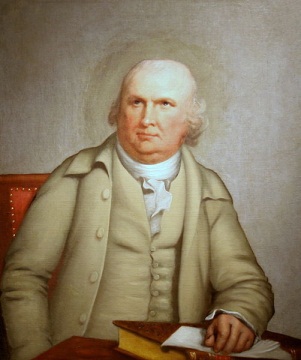
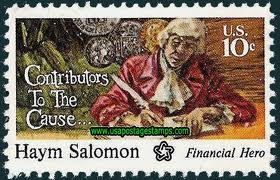
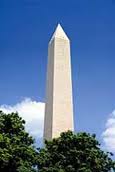
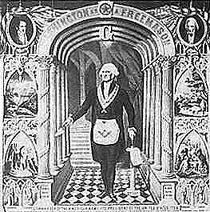
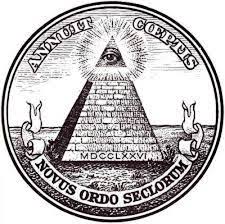
No comments:
Post a Comment
Note: Only a member of this blog may post a comment.